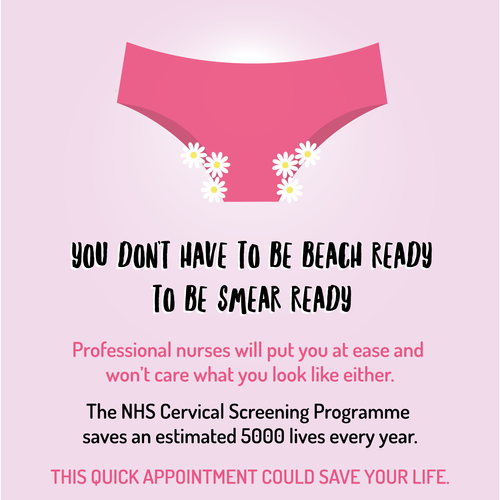Cervical Screening Awareness Campaign
Did you know that two women die every day of cervical cancer in England? Yet it is one of the most preventable cancers.
Cervical screening helps prevent cancer by checking for a virus called HPV and cervical cell changes. If left untreated, these cells can develop in to cancer.
Screening only lasts a few minutes, and you only have to go every 3 or 5 years depending on you age.
Don’t ignore your invite, and if you missed your last cervical screening, book an appointment with us now.
Please visit Jo’s Cervical Cancer Trust for more help and information by clicking here
Here are some Frequently Asked Questions ;
What is cervical screening?
- Cervical screening is a free health test available on the NHS as part of the national cervical screening programme. IT helps prevent cervical cancer by checking for a virus called high-risk HPV and cervical cell changes. It is not a test for cancer.
- It is your choice whether to go for cervical screening. We hope this information helps you make the best decision for you and your health.
Who is invited for cervical screening?
- You should be invited for cervical screening if you have a cervix. Women are usually born with a cervix. Trans men, non-binary and intersex people may also have one.
- In the UK, you are automatically invited for cervical screening if you are;
- Between the ages of 25 – 64
- Registered as female with a GP surgery
- You may get your first invite up to 6 months before you turn 25. You can book an appointment as soon as you get the invite.
How often will I be invited for cervical screening?
- Your cervical screening result will help decide when you are next invited for cervical screening.
- You may be invited:
- every year
- every 3 years
- every 5 years
- straight to colposcopy for more tests.
What is the difference between cervical screening and a smear test?
- There is no difference between cervical screening and a smear test. They are two different names for the same test.
- A smear test is the older name for the test. It was called that because of the way the test used to be done – cells were smeared on a glass slide, which was sent to the laboratory for testing.
- The test is different now and most healthcare professionals call it cervical screening. Your letter will invite you to attend cervical screening, which is why we call it that in our information
Should I go for a cervical screening if I am pregnant?
- It is usually recommended that you do not have cervical screening while you are or could be pregnant. Pregnancy can make the result of your test harder to interpret.
- If you are invited for cervical screening while pregnant, tell your doctor or nurse you are pregnant. You should wait until 3 months after your baby is born to have the test.
- If you need follow-up after an abnormal cervical screening result or treatment for cell changes, you may need to have the test while pregnant. Your GP or midwife may ask you to have it at your first antenatal appointment. This test will not affect your pregnancy.
Does cervical screening hurt?
- Everyone’s experience of cervical screening is different. Some people don’t find it uncomfortable, while for others it may be uncomfortable or hurt. There are lots of reasons, physical and psychological, for this. It is important to tell your nurse or doctor if cervical screening is painful for you.
- If you want to go for cervical screening, there are ways to make the test more comfortable and make sure you get the right support


